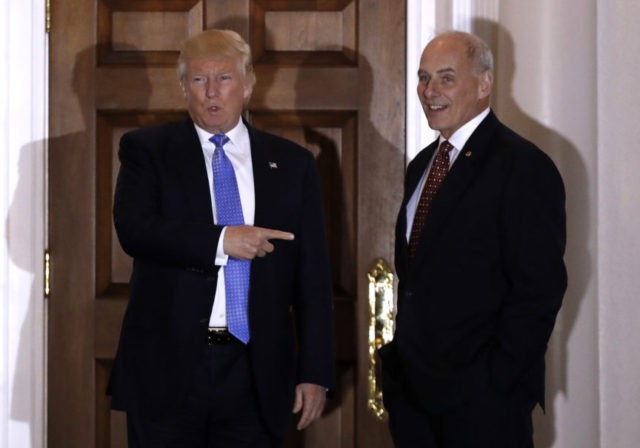Retired Marine Corps Gen. John Kelly sailed smoothly through a confirmation hearing Tuesday—with Democratic Sen. Heidi Heitkamp jokingly calling it a “lovefest”—and provided substantiative answers on how he would tackle illegal immigration, border security, and the illicit drug trade hurting the U.S. and Latin America as Secretary for the Department of Homeland Security.
Below are six important takeaways from General Kelly.
Simply building a wall is not enough to stem the tide of illicit drugs and immigration—a wall, plus increased border security, plus cooperation with Latin American countries is needed.
“A physical barrier in and of itself—certainly a military person understands defense and defenses. A physical barrier in and of itself will not do the job,” General Kelly said in response to a question about construction of a border wall from Arizona Republican Sen. John McCain. “It really has to be a layered defense. If you were to build a wall from the Pacific to the Gulf of Mexico, you’d still have to back that wall up with patrolling by human beings, by sensors, by observation devices, but as I’ve said to many of the Senators present, I believe the fence of the Southwest border really starts about 1,500 miles south, and that is partnering with some great countries as far south as Peru, really, that are very cooperative with us in terms of getting the drug production, transport… We could have better partnerships. We could work closer with them. We could give them more of what they need.”
Deportations must begin to pick up, and pick up rapidly to discourage further human smuggling and illegal immigration.
“[R]apidly processing and returning aliens to their countries of origin in significant numbers will help to immediately and significantly reduce the number of individuals and groups trying to enter the country illegally. It will not be worth the investment of their life savings to get here and it will not be worth making the dangerous trip north if they know they will quickly be put on a bus or aircraft and returned south,” General Kelly said.
Visa overstays—which “outpaced successful illegal border entries” in 2015 and let two of the 9/11 hijackers stay in the U.S. before carrying out their terrorist attack—likewise deserve attention from law enforcement.
“To the degree I’ve been in discussions on this point, apparently we don’t have a particularly good system to kind of alert when the day after someone’s visa expires. We don’t have a very good system to say, ‘This person’s visa expired’ and to share that information, whether it’s within the department, for sure, and then local law enforcement,” General Kelly said, adding that some illegals are not caught until committing another crime. “[T]he discussions I’ve had is that we’ve got to do better with systems, first of all, alerting us that someone has stayed past, and then as appropriate perhaps send someone to their house or last known residence and ask them why they haven’t departed yet.”
General Kelly added that while foreign nationals leaving the U.S. on commercial flights are recorded as leaving, those who come and go on “ground entrances” are not, and he will look into that.
If border security under the Trump administration is working, the cost of “hard” illicit drugs (excluding marijuana) will increase as their supply is restricted.
Law enforcement officers will say “that if you have an effect law enforcement strategy, I would argue an effective border strategy, you’ll start to see the cost of drugs go up,” Kelly said. “They’re dirt cheap now.”
A kilogram of one type of illicit drug in Washington, D.C. might retail for $40,000, Kelly said, while a kilogram of the same drug in the “rest of the world” would sell for $250,000. “Law enforcement people say, if you see the price going up, then you’re doing something right,” Kelly said.
The U.S. can help Latin American countries loosen the grip of drug trafficking enterprises (and halt the mass migration that brings the drugs up north) by limiting demand in the U.S. “There is no non-violent use of illicit drugs,” according to General Kelly.
“Stop the demand. If we stopped the demand—you’re never going to get to zero, we’ve talked about this, obviously. You’ll never get to zero. But stopping the demand — we just don’t have and never have had a truly comprehensive demand reduction that goes everywhere from law enforcement, treatment, rehabilitation, interdiction of large amount[s] of drugs as it’s in the flow, working with our partners down south,” he said.
“We’ve never had a real, serious public campaign in the United States,” General Kelly said, adding he had testified in April about possible domestic measures that could combat drug addiction.
“You’ll never get to zero, but we have to reduce the amount of drugs used. Forty-seven thousand Americans died last year from drug overdoses. It’s cost America over $250 billion. We’ve got to do something,” he said.
Later in the hearing, General Kelly added “incredible profits flow out of our country due to the use of drugs.”
“The average America who uses drugs recreationally doesn’t think there’s anything wrong with it,” he said. “The Latins will tell you, because of your recreational use or your hard abuse, thousands and thousands of Latins die every year, that shouldn’t die. And I just wish we had a campaign to make people understand there’s no such thing as a non-violent use of illicit drugs.”
The Trump administration should empower the men and women of Border Patrol, whose morale sunk very low under the Obama administration.
“I think the number-one thing right now would be, in accordance with the law, let the people who are tasked to protect the border do their job,” Kelly said. “The laws are there, as I understand it, but we ought to be allowed to do our job.”

COMMENTS
Please let us know if you're having issues with commenting.